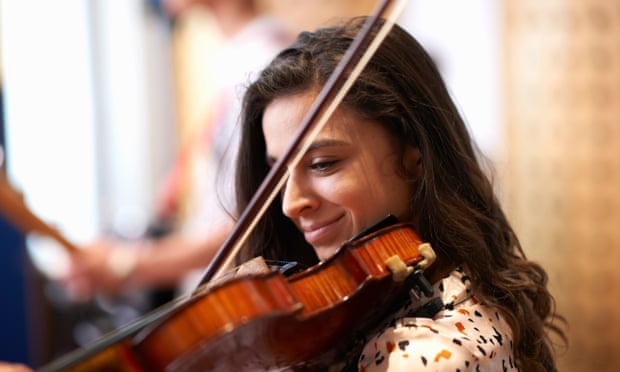Science | The Guardian: With blatant disregard for the public benefits of motivational idioms, researchers have concluded that practice does not, necessarily, make perfect.
A study of violinists found that merely good players practised as much as, if not more than, better players, leaving other factors such as quality of tuition, learning skills and perhaps natural talent to account for the difference.

6 comments:
10,000 hours always seemed rather arbitrary to me. Of course you have to work a lot to be proficient and skilled at any task, but why 10,000? And surely it’s not the same number of hours for every single task or hobby out there? Either way, I was waiting for the article to discuss the fact that not all practice is created equal. In every music class I’ve taken, teachers have stressed the importance of deliberate practice- recognizing where your shortcomings are and focusing on those; practice the parts you are bad at instead of playing through the whole song. The article chooses to focus on innate qualities that lessen one’s skill, as if there’s nothing you can do about not doing your best.
The headline of this article ignores the fact that this only applies to distinguishing the super elite from the elite. Practice will (probably) make you better than you were before, however, it may not make you the best. The argument is not against practice but rather on managing expectations of what you can get from practicing. I’m curious of what the article means when it mentions dormant genes that are expressed when someone is practicing in exceptional strain. What sorts of genes are they mentioning and what effects do they cause? Are the mostly physical or mental and do different activities trigger different dormant genes? Could we get these benefits in school, where we are essentially practicing for the real world? I also wonder how much stress the activity needs to cause for these benefits to come. Overall, I found this article fascinating. I enjoyed getting to read the science that disproved the 10,000 hour rule.
The 10,000-hour rule never made sense to me. While I get the importance of repeating an action to become an expert at it, it just seemed way to generalized. As the study shows, developing expertise depends on circumstance, or factors as the article put it. What are you learning? What is the task at hand? Why are you learning this? We shouldn’t even be encouraging learning in this way in the first place. I believe the process of learning is more important. If you aren’t able to identify the problems and failures, no matter how much you practice, you won’t get anywhere. But it is important to point out that the study’s results show the rule fails between the good and the best accomplished. Practice indeed does improve skill. What I would like to know more about that was mentioned in the article is the science portion of practicing and how it affects the brain.
Natsumi Furo
A remarkable part of this article is the quote by Macnamara: “Once you get to the highly skilled groups, practice stops accounting for the difference.” As a student who just began studying theatre and being far away from the term highly skilled, I do feel like I lack in accumulated knowledge and experiences, which needs to be obtained by practices. I believe reading and commenting on these articles 10,000 times will help me to gain an end. However, I have always felt uneasy with the 10,000-hour rule, because it sounded like the rule focused more on achieving 10,000 hours than what you get after those hours. The article has a point in a number of practices itself does not have a meaning. The most comfortable way for me to interpret this rule might be; one with the best performance accomplish 10,000 hours without noticing. As long as one measures the time of practices, one will never reach the top.
I’ve heard this saying before, both like this but also in a slightly different way – 10,000 repetitions of an action will lead to master of said action. In a way, this twist on the phrase may be a more accurate statement. At the same time, it may not. However, both of these statements may not stand the test of time. Even with 10,000 hours of practice or repetitions of an action, if the person in question stops the action and stops doing it, with time, the skill will naturally fade. Not to say it wouldn’t be picked up more easily later on, but the skill may well fade regardless. The idea of “mastery” of a skill or action is a very subjective situation. There are an abundance of factors which can play into how well one may master a skill. As the article mentioned, some people may naturally be better at certain actions, maybe not others, but they can pick up of these select skills faster than others may. There is really no set formula as to how one may be naturally good at a given skill or set of skills.
Honestly, this is a fresh take that I can appreciate! Sometimes, practice doesn't make perfect, it drives us crazy. I honestly think that if I practice something I'm good at for too long, I get worse at it! I think it may be virtually impossible to be a "master" at anything. Additionally, everyone's different. There can never be a hard number for when someone will master something, because everyone learns at a different rate. I don't think it's ever helpful to strive for perfection, because it will never be achieved. There will always be more to learn. So, yes, practicing is super important. If you want to be good at something, you have to work hard. But, as this article shows, there's no reason to drive yourself crazy trying to be perfect at something.
Post a Comment